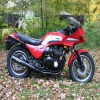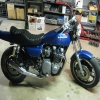Why you should NOT run higher octane than required
- otakar
-
 Topic Author
Topic Author
- Offline
- User
-

Registered
- Posts: 5073
- Thanks: 29
Why you should NOT run higher octane than required
21 Jul 2010 19:55
This article states it all and in a way that is simple to understand. Here is the link and also a direct reprint. These words are not mine they are the same as in this link.
volvospeed.com/Reviews/octane_boosters.html
Before discussing these producst, lets first address the differences between a racing fuel and pump fuel. The obvious one is octane. Under the North American octane system AKI (Anti-Knock Index) pump fuel is graded as (RON+MON)/2. Meaning if a fuel has a RON (Research Octane Number) of 96, and a MON ( Motor Octane Number) of 90 its AKI would be 93. Race fuels can be graded on any of the standards AKI, MON, RON. So what is octane and why is it important? Octane is what gives petrol its ability to resist pre-ignition. As displacement, compression, boost, RPM, go up it becomes harder to keep the fuel mixture from igniting prematurely. If under load or high heat, you experience knock with 87 octane, stepping up to 91 octane is logical step for both performance and longevity. If you experience no knock or timing pull at 91 there is no benefit to you stepping up to 93 or higher. The additives that raise octane have less energy than the base fuel, effectively lowering the BTUs of the fuel. That is you will make the most power and have the best fuel economy with the lowest octane that is capable of preventing knock under your specific conditions.
Another major distinction between race and pump fuel is RVP (Reid Vapor Pressure). The easiest, overly simplified, way to think of RVP is as a scale to rate the tendency for the fuel to want to evaporate. In general racing fuels have a much lower RVP than would be found in pump fuel due to the poor starting characteristics that come along with low RVP fuels.
Burn speed is another major difference. Race fuels are blended towards a specific application. The desired burn rate in a Kart at 16k RPM is very different than the target burn rate of something like a big block V8 at 9k RPM. Too fast of a burn and you may experience less than optimum power. Too slow and your exhaust valves may be opening before maximum pressure is reached.
Without going into specific gravity, dielectric constant, and numerous other variables, you should now have a basic understanding that there is a lot more to fuel than just octane. Altering these variables randomly can serve to be counter productive. For the purpose of objectivity lets look at one of the most common indicators. Octane. Below we have reviewed several common octane boosters. Each product was mixed in the recommended concentrations and run through an octanometer.
volvospeed.com/Reviews/octane_boosters.html
Before discussing these producst, lets first address the differences between a racing fuel and pump fuel. The obvious one is octane. Under the North American octane system AKI (Anti-Knock Index) pump fuel is graded as (RON+MON)/2. Meaning if a fuel has a RON (Research Octane Number) of 96, and a MON ( Motor Octane Number) of 90 its AKI would be 93. Race fuels can be graded on any of the standards AKI, MON, RON. So what is octane and why is it important? Octane is what gives petrol its ability to resist pre-ignition. As displacement, compression, boost, RPM, go up it becomes harder to keep the fuel mixture from igniting prematurely. If under load or high heat, you experience knock with 87 octane, stepping up to 91 octane is logical step for both performance and longevity. If you experience no knock or timing pull at 91 there is no benefit to you stepping up to 93 or higher. The additives that raise octane have less energy than the base fuel, effectively lowering the BTUs of the fuel. That is you will make the most power and have the best fuel economy with the lowest octane that is capable of preventing knock under your specific conditions.
Another major distinction between race and pump fuel is RVP (Reid Vapor Pressure). The easiest, overly simplified, way to think of RVP is as a scale to rate the tendency for the fuel to want to evaporate. In general racing fuels have a much lower RVP than would be found in pump fuel due to the poor starting characteristics that come along with low RVP fuels.
Burn speed is another major difference. Race fuels are blended towards a specific application. The desired burn rate in a Kart at 16k RPM is very different than the target burn rate of something like a big block V8 at 9k RPM. Too fast of a burn and you may experience less than optimum power. Too slow and your exhaust valves may be opening before maximum pressure is reached.
Without going into specific gravity, dielectric constant, and numerous other variables, you should now have a basic understanding that there is a lot more to fuel than just octane. Altering these variables randomly can serve to be counter productive. For the purpose of objectivity lets look at one of the most common indicators. Octane. Below we have reviewed several common octane boosters. Each product was mixed in the recommended concentrations and run through an octanometer.
74 Z1-A stock
76 KZ-900 Totaly stock vice MAC pipe
77 KZ-1000A stock
78 Z1-R 100%MINT 500 original Mi.
78 Z1-R Yoshi 1103 kit stage 1 cams Yoshi pipe. Etc
79 KZ-1300 (1400)
80 KZ-1300
81 Scratch built GPz1150R
82 KZ1000
76 KZ-900 Totaly stock vice MAC pipe
77 KZ-1000A stock
78 Z1-R 100%MINT 500 original Mi.
78 Z1-R Yoshi 1103 kit stage 1 cams Yoshi pipe. Etc
79 KZ-1300 (1400)
80 KZ-1300
81 Scratch built GPz1150R
82 KZ1000
Please Log in or Create an account to join the conversation.
- irishwill
-

- Offline
- User
-

Registered
- Posts: 597
- Thanks: 6
Re: Why you should NOT run higher octane than required
21 Jul 2010 20:54
so much to know.....
the more I know ...the more I realize how little I know....life was simple when I was 21 and knew everything;-)
the more I know ...the more I realize how little I know....life was simple when I was 21 and knew everything;-)
Please Log in or Create an account to join the conversation.
- Old Man Rock
-
- Offline
- User
-

Registered
- Posts: 6073
- Thanks: 225
Re: Why you should NOT run higher octane than required
21 Jul 2010 21:16
OK, so does this mean all the fuel additives being recommended of lately are No-Go as well then?
1976 KZ900-A4
MTC 1075cc.
Camshafts: Kawi GPZ-1100 .375 lift
Head: P&P via Larry Cavanaugh
ZX636 suspension
MIKUNI, RS-34'S...
Kerker 4-1, 1.5" comp baffle.
Dyna-S E.I.
Earls 10 row Oil Cooler
Acewell 2802 Series Speedo/Tach
Innovate LC1 Wideband 02 AFR meter
Phoenix, Az
MTC 1075cc.
Camshafts: Kawi GPZ-1100 .375 lift
Head: P&P via Larry Cavanaugh
ZX636 suspension
MIKUNI, RS-34'S...
Kerker 4-1, 1.5" comp baffle.
Dyna-S E.I.
Earls 10 row Oil Cooler
Acewell 2802 Series Speedo/Tach
Innovate LC1 Wideband 02 AFR meter
Phoenix, Az
Please Log in or Create an account to join the conversation.
- blue75kz900
-

- Offline
- User
-

Registered
- Posts: 29
- Thanks: 0
Re: Why you should NOT run higher octane than required
21 Jul 2010 21:23
Just following the post by email on my iPhone, Thanks.
Blue 1975 KZ900
Gold 1970 Chevy Nova 427...Bike killer
Gold 1970 Chevy Nova 427...Bike killer
Please Log in or Create an account to join the conversation.
- otakar
-
 Topic Author
Topic Author
- Offline
- User
-

Registered
- Posts: 5073
- Thanks: 29
Re: Why you should NOT run higher octane than required
21 Jul 2010 21:34
Old Man Rock wrote:
No, it just means that you should not bother with higher octane fuels than your bike requires. I know that this subject has been covered a few times before but this little article explains it the best. I guess, having a bit higher octane to compensate for external temperatures and other factors is OK but don't start overdoing it just because someone tells you that "Hi octane gas has more power" I believe that paraphrase has been used a couple of times here. And, as a statement, is total bull, and is most likely even the opposite. in a nut shell.'use the lowest octane fuel that makes your engine run well' Additives to keep engines clean or improve economy are something different.
OK, so does this mean all the fuel additives being recommended of lately are No-Go as well then?
No, it just means that you should not bother with higher octane fuels than your bike requires. I know that this subject has been covered a few times before but this little article explains it the best. I guess, having a bit higher octane to compensate for external temperatures and other factors is OK but don't start overdoing it just because someone tells you that "Hi octane gas has more power" I believe that paraphrase has been used a couple of times here. And, as a statement, is total bull, and is most likely even the opposite. in a nut shell.'use the lowest octane fuel that makes your engine run well' Additives to keep engines clean or improve economy are something different.
74 Z1-A stock
76 KZ-900 Totaly stock vice MAC pipe
77 KZ-1000A stock
78 Z1-R 100%MINT 500 original Mi.
78 Z1-R Yoshi 1103 kit stage 1 cams Yoshi pipe. Etc
79 KZ-1300 (1400)
80 KZ-1300
81 Scratch built GPz1150R
82 KZ1000
76 KZ-900 Totaly stock vice MAC pipe
77 KZ-1000A stock
78 Z1-R 100%MINT 500 original Mi.
78 Z1-R Yoshi 1103 kit stage 1 cams Yoshi pipe. Etc
79 KZ-1300 (1400)
80 KZ-1300
81 Scratch built GPz1150R
82 KZ1000
Please Log in or Create an account to join the conversation.
- bountyhunter
-

- Offline
- User
-

Registered
- Posts: 7245
- Thanks: 338
Re: Why you should NOT run higher octane than required
21 Jul 2010 22:20 - 21 Jul 2010 22:25
I remember the with the saturns, they said some of them ran worse on premium fuel because it changed something in the anti-knock loop or some such bizarre thing. The claim was they actually ran better on regular because of it.
I'm not sure this is applicable to street gas:
"The additives that raise octane have less energy than the base fuel, effectively lowering the BTUs of the fuel. "
High octane fuel does not have more power in it, but I also think it doesn't have LESS power either if you stay with pump gas. The unleaded premium (as I was told) is not regular with octane boosters added, it is the portion of the recovered gas which has the higher octane from the refining process. It's likely that racing fuel and AVgas have boosters in them because they need octanes way above 100.
I'm not sure this is applicable to street gas:
"The additives that raise octane have less energy than the base fuel, effectively lowering the BTUs of the fuel. "
High octane fuel does not have more power in it, but I also think it doesn't have LESS power either if you stay with pump gas. The unleaded premium (as I was told) is not regular with octane boosters added, it is the portion of the recovered gas which has the higher octane from the refining process. It's likely that racing fuel and AVgas have boosters in them because they need octanes way above 100.
1979 KZ-750 Twin
Last edit: 21 Jul 2010 22:25 by bountyhunter.
Please Log in or Create an account to join the conversation.
- otakar
-
 Topic Author
Topic Author
- Offline
- User
-

Registered
- Posts: 5073
- Thanks: 29
Re: Why you should NOT run higher octane than required
22 Jul 2010 00:13
By FAA regulations unless you have an "experimental" rating on your aircraft you may not run any additives in the fuel. Av gas has nothing besides TEL added. Even airplanes that run 87UL (unleaded) must be specially certified. You can even run just any engine oil in the engines. They must be aviation certified, such as AeroSHELL50
74 Z1-A stock
76 KZ-900 Totaly stock vice MAC pipe
77 KZ-1000A stock
78 Z1-R 100%MINT 500 original Mi.
78 Z1-R Yoshi 1103 kit stage 1 cams Yoshi pipe. Etc
79 KZ-1300 (1400)
80 KZ-1300
81 Scratch built GPz1150R
82 KZ1000
76 KZ-900 Totaly stock vice MAC pipe
77 KZ-1000A stock
78 Z1-R 100%MINT 500 original Mi.
78 Z1-R Yoshi 1103 kit stage 1 cams Yoshi pipe. Etc
79 KZ-1300 (1400)
80 KZ-1300
81 Scratch built GPz1150R
82 KZ1000
Please Log in or Create an account to join the conversation.
- Polar_Bus
-

- Offline
- User
-

Registered
- Posts: 256
- Thanks: 7
Re: Why you should NOT run higher octane than required
22 Jul 2010 02:05
Race fuel actually burns slower than low octain pump fuel. However race fuel burns much more complete. Most all engine performance builders will tell you if you're tuned for 87 octain, run it, and don't bother with CAM II just because it smells "cool" (we've all done this at one point  ). You're just wasting money !
). You're just wasting money !
Bikes:
'84 GPz1100
'06 HD Fatboy
'84 GPz1100
'06 HD Fatboy
Please Log in or Create an account to join the conversation.
- otakar
-
 Topic Author
Topic Author
- Offline
- User
-

Registered
- Posts: 5073
- Thanks: 29
Re: Why you should NOT run higher octane than required
22 Jul 2010 08:01 - 22 Jul 2010 08:02
Octane and burn rate are different things. Octane is simply the fuels resistance to premature ignition. Burn rate can also be controlled by chemical means but is normally controlled by the engine itself. As pressure goes up burn rate speeds up. As pressure goes down the burn rate slows down. The engine controls the burn rate by the shape of the combustion chamber and cam timing and overlap, to name a few but not all methods. The temperature inside the combustion chamber also affect the burn rate, and this is why many people confuse burn rate with Octane. Because combustion is also controlled by the temperature inside the combustion chamber temperature. Gasolines do have different burn rates, is true. Aviation gas has a very slow burn rate because it is designated for very low RPM and with very mild cam timing and lift. Most older large displacement cars do not like modern gas, because modern gas burns faster and the older cars turn slower and require more time to burn the gas. Actually racing gas burns a bit faster than pump gas because it must be burned more completely in the amount of time alloted in a high RPM engine. Todays pump gas is a compromise, to accommodate the large variety of engines on the road that will be using it. In a way, we are lucky, The engines in our vintage bikes turn about the same RPM as many and maybe most Hi RPM cars do today for which modern gas is designed. It is the guys with the old stock 454 Chevys, the 455 Odsmobiles and 500 Cadilacs that suffer. Allong with the guys that ride these 16/17/18/20000 RPM modern bikes that have gas problems. so don't confuse burn rate with Octane. One do not refer to the other. You can have a high octane fuel with both a hi burn rate and with a slow burn rate. Same with regular gas and other fuel. Diesel fuel for instance has a very low octane rating of about 15-25 and also burns extremely slowly. 100LL Av-Gas has 100RON and burns only a bit faster then Diesel. Ethyl ether for example has an extremely high burn rate but also has a high octane rating and can be used to prevent ignition in engines with compression up to 20:2. Burn rate is directly proportional to volatility. Volatility is directly proportional to fuel vapor pressure. So on and so forth. So please do not mistake octane for burn rate. One may affect the other, but that is only due to the particular hydrocarbon being used to control one or the other.
Boy I'm out of breath after that one. :S :blush: :laugh:
Boy I'm out of breath after that one. :S :blush: :laugh:
74 Z1-A stock
76 KZ-900 Totaly stock vice MAC pipe
77 KZ-1000A stock
78 Z1-R 100%MINT 500 original Mi.
78 Z1-R Yoshi 1103 kit stage 1 cams Yoshi pipe. Etc
79 KZ-1300 (1400)
80 KZ-1300
81 Scratch built GPz1150R
82 KZ1000
76 KZ-900 Totaly stock vice MAC pipe
77 KZ-1000A stock
78 Z1-R 100%MINT 500 original Mi.
78 Z1-R Yoshi 1103 kit stage 1 cams Yoshi pipe. Etc
79 KZ-1300 (1400)
80 KZ-1300
81 Scratch built GPz1150R
82 KZ1000
Last edit: 22 Jul 2010 08:02 by otakar.
Please Log in or Create an account to join the conversation.
- Polar_Bus
-

- Offline
- User
-

Registered
- Posts: 256
- Thanks: 7
Re: Why you should NOT run higher octane than required
22 Jul 2010 09:22
otakar wrote:
Yea, my eyes are bleeding from reading it as well. Great writeup just the same !
Octane and burn rate are different things. Octane is simply the fuels resistance to premature ignition. Burn rate can also be controlled by chemical means but is normally controlled by the engine itself. As pressure goes up burn rate speeds up. As pressure goes down the burn rate slows down. The engine controls the burn rate by the shape of the combustion chamber and cam timing and overlap, to name a few but not all methods. The temperature inside the combustion chamber also affect the burn rate, and this is why many people confuse burn rate with Octane. Because combustion is also controlled by the temperature inside the combustion chamber temperature. Gasolines do have different burn rates, is true. Aviation gas has a very slow burn rate because it is designated for very low RPM and with very mild cam timing and lift. Most older large displacement cars do not like modern gas, because modern gas burns faster and the older cars turn slower and require more time to burn the gas. Actually racing gas burns a bit faster than pump gas because it must be burned more completely in the amount of time alloted in a high RPM engine. Todays pump gas is a compromise, to accommodate the large variety of engines on the road that will be using it. In a way, we are lucky, The engines in our vintage bikes turn about the same RPM as many and maybe most Hi RPM cars do today for which modern gas is designed. It is the guys with the old stock 454 Chevys, the 455 Odsmobiles and 500 Cadilacs that suffer. Allong with the guys that ride these 16/17/18/20000 RPM modern bikes that have gas problems. so don't confuse burn rate with Octane. One do not refer to the other. You can have a high octane fuel with both a hi burn rate and with a slow burn rate. Same with regular gas and other fuel. Diesel fuel for instance has a very low octane rating of about 15-25 and also burns extremely slowly. 100LL Av-Gas has 100RON and burns only a bit faster then Diesel. Ethyl ether for example has an extremely high burn rate but also has a high octane rating and can be used to prevent ignition in engines with compression up to 20:2. Burn rate is directly proportional to volatility. Volatility is directly proportional to fuel vapor pressure. So on and so forth. So please do not mistake octane for burn rate. One may affect the other, but that is only due to the particular hydrocarbon being used to control one or the other.
Boy I'm out of breath after that one. :S :blush: :laugh:
Yea, my eyes are bleeding from reading it as well. Great writeup just the same !
Bikes:
'84 GPz1100
'06 HD Fatboy
'84 GPz1100
'06 HD Fatboy
Please Log in or Create an account to join the conversation.
- otakar
-
 Topic Author
Topic Author
- Offline
- User
-

Registered
- Posts: 5073
- Thanks: 29
Re: Why you should NOT run higher octane than required
22 Jul 2010 12:04
There have been so many half-truth discussions about the subject and what is the best gas and burn rate, and Bla, Bla, Bla. I just thought it was time to do some research. I looked on the web and there was really no clear answers and much of the time, facts completely contradicted themselves. I just thought that It would be nice to talk to the PHD engineers at Argonne and get some real facts. The point was, not as much for the sake of this forum but because i was really interested and curious. And the nice part is that i can just walk over there and get the info I need. Their engine and fuel research department is awesome. They have buildings full of dynos and research all kinds of fuels. I was looking at an engine which runs on natural gas, that has a compression of 20:1 and requires a laser ignition system because the chamber will not sustain a spark. They capture the exhaust gases and use a catalyst to extract the Nitrogen from it than pump it back into the cylinder to cool it and stabilize the combustion. Somehow it reduces other exhaust gas emissions.
74 Z1-A stock
76 KZ-900 Totaly stock vice MAC pipe
77 KZ-1000A stock
78 Z1-R 100%MINT 500 original Mi.
78 Z1-R Yoshi 1103 kit stage 1 cams Yoshi pipe. Etc
79 KZ-1300 (1400)
80 KZ-1300
81 Scratch built GPz1150R
82 KZ1000
76 KZ-900 Totaly stock vice MAC pipe
77 KZ-1000A stock
78 Z1-R 100%MINT 500 original Mi.
78 Z1-R Yoshi 1103 kit stage 1 cams Yoshi pipe. Etc
79 KZ-1300 (1400)
80 KZ-1300
81 Scratch built GPz1150R
82 KZ1000
Please Log in or Create an account to join the conversation.
- beefsquasher
-

- Offline
- User
-

Registered
- Posts: 112
- Thanks: 0
Re: Why you should NOT run higher octane than required
24 Jul 2010 13:53
...or you could just put premium in your bike every time, take comfort in the fact that you bike wont ping even when it gets really hot, and ride it for thousands and thousands of miles with no problems whatsoever.
-Dave
-Dave
1977 KZ1000 Mutt - 1075, Kenny Harmon Cams .400", RS34, Kerker, Dyna S
1997 Honda XR250R
1977 Yamaha XS360
1972 BMW R60/5
1997 Honda XR250R
1977 Yamaha XS360
1972 BMW R60/5
Please Log in or Create an account to join the conversation.
Moderators: Street Fighter LTD
